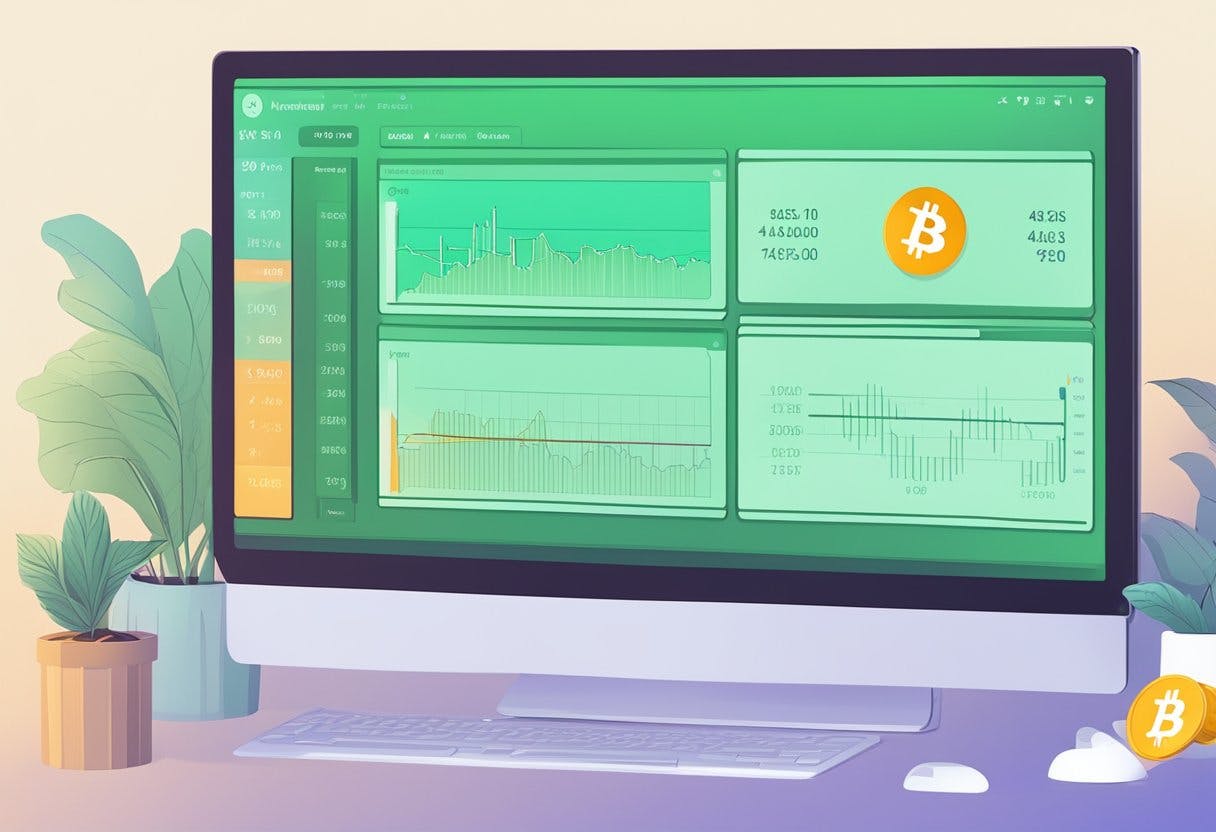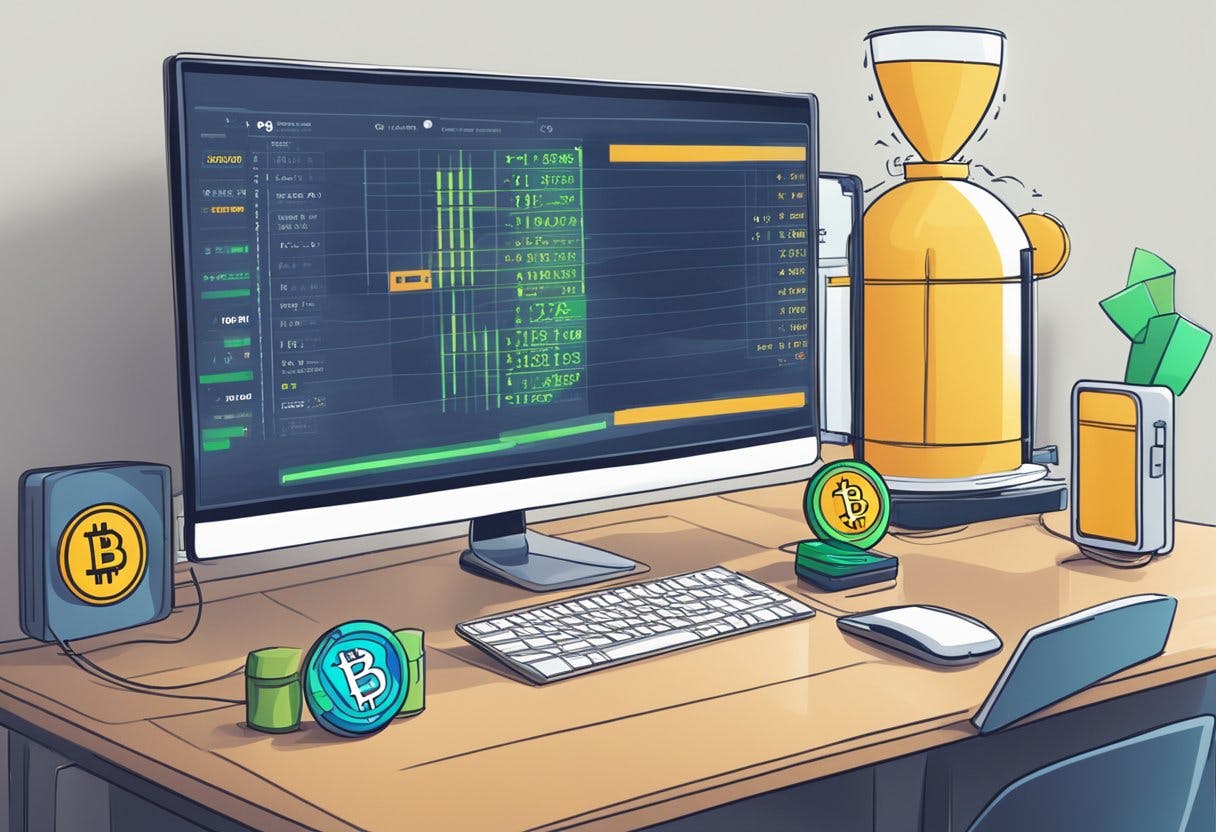
Cryptocurrency transactions are known for their speed and efficiency, but sometimes they can take longer than expected to confirm. This can be frustrating for users who expect their transactions to go through quickly. There are several reasons why cryptocurrency transactions can take longer to confirm, and understanding these factors can help users troubleshoot and prevent delays.

One of the main factors that influence transaction confirmation times is network congestion. When there are a lot of transactions waiting to be processed, miners prioritize transactions with higher fees. This means that transactions with lower fees may take longer to confirm. Additionally, the size of the transaction and the number of inputs and outputs can also affect confirmation times.
Another factor that can influence transaction confirmation times is the role of miners in processing transactions. Miners are responsible for verifying and adding transactions to the blockchain, and they are incentivized to do so by earning transaction fees and block rewards. However, the competition among miners can also lead to delays, as miners may prioritize transactions with higher fees or choose to mine certain blocks over others.
Key Takeaways
- Network congestion and transaction fees can significantly impact transaction confirmation times.
- Miners play a crucial role in processing transactions, but their competition can also lead to delays.
- Troubleshooting slow transaction confirmations may require advanced considerations and technologies.
Understanding the Basics of Cryptocurrency Transactions

What Is a Confirmation?
When a cryptocurrency transaction is initiated, it is broadcasted to the network and added to the mempool. The mempool is a pool of unconfirmed transactions waiting to be picked up by miners and added to the blockchain.
A confirmation is the process by which a miner validates a transaction and adds it to the blockchain. Each confirmation represents a new block on the blockchain, and once a transaction has been confirmed, it cannot be reversed or altered.
The number of confirmations required for a transaction to be considered final varies depending on the cryptocurrency. For example, Bitcoin transactions are typically considered final after six confirmations.
How Transactions Work on the Blockchain
A blockchain is a decentralized, distributed ledger that records all transactions on a network. Each block on the blockchain contains a set of transactions, and once a block is added to the blockchain, it cannot be altered or deleted.
When a miner validates a transaction and adds it to a block, they receive a reward in the form of cryptocurrency. This reward incentivizes miners to validate transactions and add them to the blockchain.
To ensure that the blockchain remains secure and decentralized, miners must compete to add new blocks to the blockchain. This competition is known as mining, and it involves solving complex mathematical problems to validate transactions and add them to the blockchain.
In summary, cryptocurrency transactions are validated and added to the blockchain through a process of confirmation, which involves miners competing to add new blocks to the blockchain. Once a transaction has been confirmed, it is considered final and cannot be reversed or altered.
Factors Influencing Transaction Confirmation Times

When sending a cryptocurrency transaction, the time it takes to confirm can vary based on several factors. Understanding these factors can help users make informed decisions when sending transactions.
Network Traffic and Congestion
One of the main factors that can impact transaction confirmation times is network traffic and congestion. When the number of transactions being sent on the network increases, the time it takes for each transaction to be confirmed can increase as well. This is because each transaction needs to be verified by nodes on the network, and if there are a large number of transactions, it can take longer for nodes to process them.
Transaction Fees and Their Role
Transaction fees play an important role in determining the priority of a transaction on the network. Transactions with higher fees are typically processed more quickly than those with lower fees. This is because miners on the network are incentivized to include transactions with higher fees in the blocks they mine, as they receive a portion of the fees as a reward.
Block Size and Its Impact
The size of blocks on the network can also impact transaction confirmation times. Each block on the network has a maximum size limit, and if the number of transactions waiting to be confirmed exceeds this limit, it can take longer for transactions to be processed. This is because miners need to prioritize which transactions to include in their blocks, and if there are too many transactions, they may need to wait for a larger block to be mined before they can include all of them.
Overall, understanding these factors can help users make informed decisions when sending cryptocurrency transactions. By adjusting transaction fees and being aware of network congestion and block size limits, users can help ensure that their transactions are confirmed in a timely manner.
The Role of Miners in Transaction Processing
Cryptocurrency transactions require a network of computers to process them. Miners are the nodes on the network that process transactions by solving complex mathematical problems. They are rewarded with newly minted coins and transaction fees for their work.
How Miners Prioritize Transactions
Miners prioritize transactions based on the transaction fee attached to them. Transactions with higher fees are prioritized over those with lower fees. This is because miners are incentivized to process transactions that will earn them the most money.
During times of high network traffic, transactions with lower fees may take longer to confirm or may not be confirmed at all. This is because miners have limited capacity to process transactions and will prioritize those with higher fees.
The Mining Process and Block Confirmation
Once a miner has solved a mathematical problem, they create a new block on the blockchain. This block contains a record of all the transactions that the miner has processed.
Once a block is created, it is broadcast to the network and other nodes verify that the transactions in the block are valid. Once the block is verified, it is added to the blockchain and the transactions it contains are considered confirmed.
The time it takes for a block to be confirmed depends on the network traffic and the difficulty of the mathematical problem that needs to be solved. The more network traffic there is, the longer it will take for a block to be confirmed.
In conclusion, miners play a crucial role in the processing of cryptocurrency transactions. They prioritize transactions based on the transaction fee attached to them and confirm transactions by creating new blocks on the blockchain. The time it takes for a transaction to be confirmed depends on the network traffic and the difficulty of the mathematical problem that needs to be solved.
Troubleshooting Slow Transaction Confirmations
Slow transaction confirmations can be frustrating, but there are a few steps you can take to troubleshoot the issue. In this section, we will cover how to check transaction status on blockchain.com and possible solutions for accelerating confirmations.
Checking Transaction Status on Blockchain.com
One of the easiest ways to check the status of a transaction is to use blockchain.com. Simply enter the transaction ID or wallet address into the search bar, and the site will provide information on the transaction’s status and confirmations.
If the transaction is unconfirmed, it means that it has not yet been added to a block and is waiting for confirmation. This can occur when there is high network congestion or when the transaction fee is too low.
Possible Solutions for Accelerating Confirmations
If a transaction is taking too long to confirm, there are a few possible solutions to accelerate the process:
- Increase the transaction fee: One reason a transaction may be delayed is if the fee is too low. By increasing the fee, miners are incentivized to prioritize the transaction and add it to a block.
- Use an accelerator: Some services offer transaction accelerators that prioritize unconfirmed transactions. These services typically require a fee, but they can be useful if you need a transaction to be confirmed quickly.
- Wait: In some cases, the best solution is simply to wait. If the network is congested, transactions can take longer to confirm. However, they will eventually be added to a block.
It’s important to note that the appropriate fee for a transaction can vary depending on network congestion and other factors. It’s always a good idea to check the current recommended fee before sending a transaction.
In conclusion, slow transaction confirmations can be frustrating, but there are steps you can take to troubleshoot the issue. By checking transaction status on blockchain.com and considering possible solutions for accelerating confirmations, you can help ensure that your transactions are confirmed in a timely manner.
Advanced Considerations and Technologies
Impact of Network Upgrades and Forks
Cryptocurrency networks are constantly evolving, with upgrades and forks being implemented to improve transaction speed and security. However, these changes can also have unintended consequences on transaction times. For example, a hard fork can lead to a temporary slowdown in transaction processing as nodes adjust to the new network rules.
One promising technology for improving transaction speed is the Lightning Network. This layer 2 scaling solution allows for near-instantaneous transactions off-chain, while still maintaining the security of the underlying blockchain. However, adoption of the Lightning Network is still in its early stages, and it may take time for it to become widely used.
Emerging Solutions for Faster Transactions
In addition to the Lightning Network, there are other emerging technologies that aim to improve transaction speed and reduce fees. For example, some wallets and exchanges now offer the ability to use replace-by-fee (RBF) or child-pays-for-parent (CPFP) transactions. These allow users to incentivize miners to prioritize their transactions by offering higher fees.
Hardware wallets are another option for those who prioritize security and transaction speed. By storing cryptocurrency offline, these devices offer protection against hacking and other security threats. Additionally, some hardware wallets allow for faster transaction processing by using their own proprietary software.
It’s important to note that while these technologies can improve transaction speed and security, they may also come with additional costs. For example, the electricity required to run a Lightning Network node or a hardware wallet can be significant. Users should carefully consider the trade-offs between speed, security, and cost when choosing a cryptocurrency transaction method.
Frequently Asked Questions
What factors affect the confirmation time of a Bitcoin transaction?
Several factors can impact the confirmation time of a Bitcoin transaction, including the transaction fee, network congestion, and the size of the transaction. Transactions with higher fees are generally prioritized by miners, while larger transactions may take longer to confirm due to the increased amount of data that must be processed.
How can I track the status of my pending blockchain transaction?
Most blockchain networks provide a transaction ID that can be used to track the status of a pending transaction. Users can enter this ID into a blockchain explorer, which will display information about the transaction, including its current status and the number of confirmations it has received.
Is there a way to expedite the confirmation of my cryptocurrency transaction?
One way to expedite the confirmation of a cryptocurrency transaction is to increase the transaction fee. Miners are incentivized to prioritize transactions with higher fees, so increasing the fee can help ensure that the transaction is processed more quickly.
What does it mean when my Bitcoin transaction is unconfirmed after several hours?
When a Bitcoin transaction is unconfirmed after several hours, it means that it has not yet been added to a block in the blockchain. This can occur if the transaction fee is too low or if there is a high volume of transactions on the network.
How does network congestion impact transaction confirmation times?
Network congestion can significantly impact transaction confirmation times by creating a backlog of transactions that must be processed by miners. During periods of high network activity, it may take longer for transactions to be confirmed, and fees may also increase due to the increased demand for processing power.
What are the typical timeframes for cryptocurrency transaction confirmations?
The typical timeframe for cryptocurrency transaction confirmations can vary depending on the network and the transaction fee. In general, Bitcoin transactions can take anywhere from several minutes to several hours to confirm, while transactions on other networks may be confirmed more quickly.
Read More




